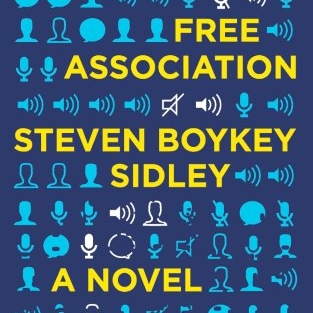
News

A love letter to the art of podcasts
STEVEN KRAWITZ
Free Association is Sidley’s fourth novel and displays the local author at a new high point in his writing career. The trajectory from debut novel Entanglement (2012) to his new one clearly reveals his growth in confidence, depth and maturity.
Free Association is the story of Maxwell Lurie, a single thirty-something, battling to navigate his way in contemporary Los Angeles, dealing with a dying father, family revelations that recast his entire life, lack of a girlfriend and his current gig as a podcaster.
The book is an extended love letter to the nascent art form of podcasts, downloadable good quality recorded talks on any topic that remind one of a cross between good radio and documentaries.
Sidley says that he enjoys listening to podcasts so much; they are all he listens to in the car and looks forward to traffic jams as they afford him the opportunity to listen to more of them.
Sidley spent 17 years living in Los Angeles and returned to South Africa in the 1990s for a family emergency. On that trip, he met his future wife Kate and decided to make South Africa his home. His knowledge of LA infuses Free Association with an authentic backdrop for the unfolding drama, but the story is universal and could just as easily have been set in Johannesburg.
Like another local Jewish South African artist, Johnny Clegg, Sidley has a strong following in France. This is not a surprise as French literary fiction is proudly philosophical, as is Sidley’s.
Sidley uses Maxi Lurie’s podcasts and ruminations to explore the major issues we all face, to test morality codes, analyse relationships, assess the value of psychological therapies, ponder on technology’s impact on society and to ask what a good life and success is today.
Within the framework of English literature, Sidley brings to mind the writings of Ian McEwan, especially Saturday and his recent retelling of Hamlet, Nutshell.
Whereas some of McEwan’s observations on society can feel like a journalism primer for the left leaning Guardian newspaper, Sidley’s critiques are spot on, making this reader a little jealous he could not express them as succinctly.
Another literary reference, used to great effect is Chekhov’s Gun: “if you say in the first chapter that there is a rifle hanging on the wall, in the second or third chapter it absolutely must go off. If it is not going to be fired, it should not be hanging there.”
While researching how easy it is to buy an illegal gun on the dark web, Lurie buys the gun in question which then links many of the characters and their personal motives.
After having broken into the South Africa, French and British book markets, Sidley is making his debut in the all-important American market with Free Association, as good a reason as any for setting it in Los Angeles.
Sidley has created a broad cast of colourful characters: a black South African podcast producer, a mini-celebrity tech guru, a damaged homeless man who sleeps in the alleyway next to Lurie’s apartment block who holds a PhD in physics, and a college friend whose golden-boy trajectory was destroyed by a sexual assault allegation.
This is a novel of raw, imperfect humans finding their way forward, profound and exquisitely told.




